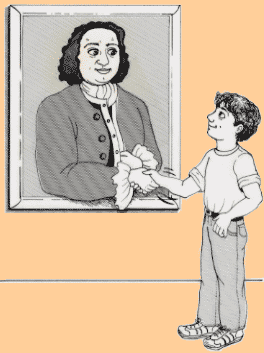Biography
Lesson Four
MEET GEORGE MASON
 READ AND DISCUSS READ AND DISCUSS
(in small groups)
I. Did you ever give up something that was important to you because you wanted to help someone else? Did you ever decide to do something which made you unpopular? This happened to George Mason of Virginia over 200 years ago!
George Mason got his name from his great-grandfather. George Mason I left Great Britain in about 1651 to make a home in the new land of Virginia. By the time of George's birth in 1725, his family was quite important in the colony. Sadly, when George was only ten, his father died in a boat accident. George, his sister Mary, and his brother Thomson were raised by their mother, Ann. They lived on a plantation called Chopawamsic, south of the Occoquan River in Virginia.
There weren't public schools back then, so children received an education in all sorts of ways. George was taught at home by tutors hired by his mother. When he was twelve, he went to a private school, called an academy, in Maryland. The family minister helped along his education by ordering books for him from Great Britain. Young George liked to read.
What important events took place in George Mason's early life?
II. When George Mason turned twenty-one, he began taking care of the tobacco plantations he had inherited from his father. This was a big job, since there was a lot of land. Several years later, he married Ann Eilbeck from Maryland. When they began having children, Mason decided to build a fine house on the Potomac River for his new family. He named the house Gunston Hall after a house owned by his ancestors in Great Britain.
George and Ann Mason raised nine children. There were five boys -- the eldest named George, of course -- and four girls. Mason enjoyed spending time at Gunston Hall with his family and friends. However, when he was working on serious business, he sometimes became absent-minded. He sometimes forgot which of his children were at home and which were away on a trip!
During most of his life, Mason suffered from a disease called gout. At times, the joints in his legs swelled and he used crutches to help him walk. As you might imagine, the discomfort made him cranky at times, even to his family and guests at Gunston Hall.
Describe George Mason's life at Gunston Hall.
III. George Mason preferred his life at home over public service or government. However, in the 1770s, he became distressed by how Great Britain was treating the colonists of Virginia. He decided to enter politics.
In 1776, Mason was one of the men who met in Williamsburg, Virginia to declare their colony's independence from Great Britain. He wrote the document, the Virginia Declaration of Rights (VDR). The VDR stated that people had the right to liberty, property, and the pursuit of happiness. These rights were the basis of government. Mason's words inspired other colonies like Massachusetts and Maryland to create their own declarations of rights. It was an exciting time!
Why was the Virginia Declaration of Rights important?
IV. George Mason's help was needed in 1787. Fifty-five leaders from all over America were gathering in Philadelphia to discuss the future of the country. Mason was one of the men selected as a delegate, or representative, for Virginia. The delegates began writing a new plan, called a constitution, for the government.
During the discussions, Mason's opinions set him apart from most of the other delegates. He was concerned that the central government would become too powerful. He believed that it was wrong to bring more slaves into the country. He felt that the nation's constitution needed a declaration of rights.
In the end, Mason (along with Edmund Randolph and Elbridge Gerry) refused to sign the Constitution. This was their way of showing that they did not approve of the new plan of government. Later, Mason wrote that he was willing to make an unpopular decision because he believed that he was right. What would you have done?
In the last years of his life, Mason continued to manage his plantations. He found time to read and entertain guests at Gunston Hall. Mason was pleased when in 1791 the states approved a bill of rights for the nation. This was what he had been talking about four years ago in Philadelphia. People had finally seen the wisdom of his idea.
What happened to Mason's idea for a national bill of rights?
Are you interested in finding out more about George Mason? Good readers might want to look at George Mason: Father of the Bill of Rights, by Carla Heymsfeld and Joan Lewis.
  |

 READ AND DISCUSS
READ AND DISCUSS